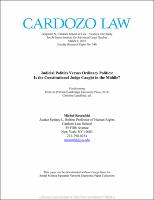Please use this identifier to cite or link to this item:
https://hdl.handle.net/20.500.12202/10078| Title: | Judicial politics versus ordinary politics: Is the constitutional judge caught in the middle? |
| Authors: | Rosenfeld, Michel Landfried, C. |
| Keywords: | ordinary politics judicial politics judicial philosophy antimajoritarianism and democracy living tree constitution originalism adaptionism |
| Issue Date: | 2019 |
| Publisher: | Cambridge University Press |
| Citation: | Rosenfeld, M. (2019). Judicial politics versus ordinary politics: Is the Constitutional judge caught in the middle? In C. Landfried (Ed.), Judicial power (pp. 36-65). Cambridge, UK: Cambridge University Press. |
| Abstract: | Democratic politics are built upon the majority principle, but no contemporary constitutional democracy can live on that principle alone. To sustain key anti-majoritarian pillars of democracy, such as fundamental rights, it is often necessary to override majority politics through deployment of an anti-majoritarian institution—typically, the Constitutional or Supreme Court. In certain countries, like the US, all major divisive political issues, such as abortion and same-sex marriage, typically end up before the courts. Reactions to judicial decisions on these issues being usually highly political, courts figure prominently in politics thus triggering a shift from majoritarian to anti-majoritarian politics. Courts cannot avoid being in politics, but are judicial politics similar to ordinary politics? Is the nature of the politics involved the same and only its locus different? Or are judicial politics altogether different from ordinary politics, hence safeguarding salutary checks and balances against potential excesses stemming from the latter? I defend the thesis that judges have a politics of their own that is distinguishable from ordinary politics, but that often blends and overlaps with the latter. Judicial politics concern the ideals, ideology, practices and procedures of adjudication. Reasonable judges may disagree as to which of various positions within this ambit is preferable. For example, in the US there is a controversy between originalists and adaptionists, but neither of these positions necessarily aligns with any particular position within ordinary politics. In some exceptional cases, such as Bush v. Gore, judges stray from their judicial politics and lapse into ordinary politics. Far from undermining the thesis I defend, such latter cases reinforce it by highlighting the bounds between what ought to be judicially permissible and what would cross the line of legitimate judicial politics. |
| Description: | Scholarly article / Open access |
| URI: | https://papers.ssrn.com/sol3/papers.cfm?abstract_id=3099752 https://hdl.handle.net/20.500.12202/10078 |
| ISBN: | 9781108443098 |
| Appears in Collections: | Benjamin N. Cardozo School of Law: Faculty Publications |
Files in This Item:
| File | Description | Size | Format | |
|---|---|---|---|---|
| Rosenfeld (2018) OA Judicial politics versus ordinary.pdf | 1.08 MB | Adobe PDF |  View/Open |
This item is licensed under a Creative Commons License

